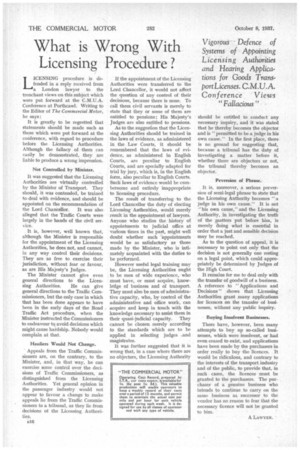What is Wrong With Licensing Procedure ?
Page 50

If you've noticed an error in this article please click here to report it so we can fix it.
Vigorous Defence of Systems of Appointing Licensing Authorities and Hearing App hattions for Goods TransportLicenses. C.M.0 . A. Conference Views
" Fallacious "
LICENSING procedure is defended in a reply received from a London lawyer to the trenchant views on this subject which were put forward at the C,M.U.A. Conference at Porthcawl. Writing to the Editor of The Commercial Motor, he says :
It is greatly to be regretted that statements should be made such as those which were put forward at the conference, with regard to procedure before the Licensing Authorities. Although the fallacy of them can easily be demonstrated, they are liable to produce a wrong impression.
Not Controlled by Minister.
It was suggested that the Licensing Authorities are virtually controlled by the Minister of Transport. They should, it was contended, be trained to deal with evidence, and should be appointed on the recommendation of the Lord Chancellor. It was also alleged that the Traffic Courts were largely in the hands of the civil service.
It is, however, well known that, although the Minister is responsible for the appointment of the Licensing Authorities, he does not, and cannot, in any way control their decisions, They are as free to exercise their jurisdiction, without fear or favour, as are His Majesty's Judges.
The Minister cannot give even general directions to the Licen sing Authorities. He can give general directions to the Traffic Commissioners, but the only case in which that has been done appears to have been in the early days of the Road Traffic Act procedure, when the Minister instructed the Commissioners to endeavour to avoid decisions which might cause hardship. Nobody would complain at that.
Hauliers Would Not Change.
" Appeals from the Traffic Commissioners are, on the contrary, to the Minister, and, in that way, he can exercise some control over the decisions of Traffic Commissioners, as distinguished from the Licensing Authorities. Yet general opinion in the passenger industry would not appear to favour a change to make appeals lie from the Traffic Commissioners to a tribunal, as they lie from decisions ot the Licensing Authorities.
B16 If the appointment of the Licensing Authorities were transferred to the Lord Chancellor, it would not a.ffect the question of any control of their decisions, because there is none. To call them civil servants is merely to state that they or some of them are entitled to pensions ; His Majesty's Judges are also entitled to pensions.
As to the suggestion that the Licensing Authorities should be trained in the laws of evidence, as administered in the Law Courts, it should be remembered that the laws of evidence, as administered in English Courts, are peculiar to English Courts, and are specially adapted for trial by jury, which is, in the English form, also peculiar to English Courts. Such laws of evidence would be cumbersome and entirely inappropriate to licensing procedure.
The result of transferring to the Lord Chancellor the duty of electing Licensing Authorities, would merely result in the appointment of lawyers. Anyone who studies the history of appointments to judicial office at various times in the past, might well doubt whether such appointments would be as satisfactory as those made by the Minister, who is intimately acquainted with the duties to be performed.
However useful legal training may be, the Licensing Authorities ought to be men of wide experience, who must have, or must acquire, knowledge of business and of transport. They must also be men of administrative capacity, who, by control of the administrative and office work, can , acquire and keep in touch with the knowledge necessary to assist them in their quasi-judicial capacity. They cannot be chosen merely according to the standards which are to he applied in selecting judges and magistrates.
It was further suggested that it is wrong that, in a case where there are no objectors, the Licensing Authority should be entitled to conduct any necessary inquiry, and it was stated that he thereby becomes the objector and is "permitted to be a judge in his own cause." In the first place, there is no ground for suggesting that, because a tribunal has the duty of investigating a matter before it, whether there are objectors or not, the tribunal thereby becomes an objector.
Peversion of Phrase.
It is, moreover, a serious perversion of semi-legal phrase to state that the Licensing Authority becomes "a judge hi his own cause." It is not his own cause," and the Licensing Authority, in investigating the truth of the platters put before him, is merely doing what is essential in order that a just and sensible decision may be reached.
As to the question of appeal, it is necessary to point out only that the decision is not generally one resting on a legal point, which could appropriately be determined by judges of the High Court.
It remains for me to deal only with the transfer of goodwill of a business. A reference to "Applications and Decisions" shows that Licensing Authorities grant many applications for licences on the transfer of businesses, without any public inquiry.
Buying Insolvent Businesses.
There have, however, been many attempts to buy up so-called businesses, which were insolvent, or had even ceased to exist, and applications have been made by the purchasers in order really to buy the licences. It would be ridiculous, and contrary to the interests of the transport industry and of the public, to provide that, in such cases, the licences must be granted to the purchasers. The purchaser of a genuine business who intends to continue to carry on the same business as successor to the vendor has no reason to fear that the necessary licence will not be granted to him.
• A Lawyna.




























































































